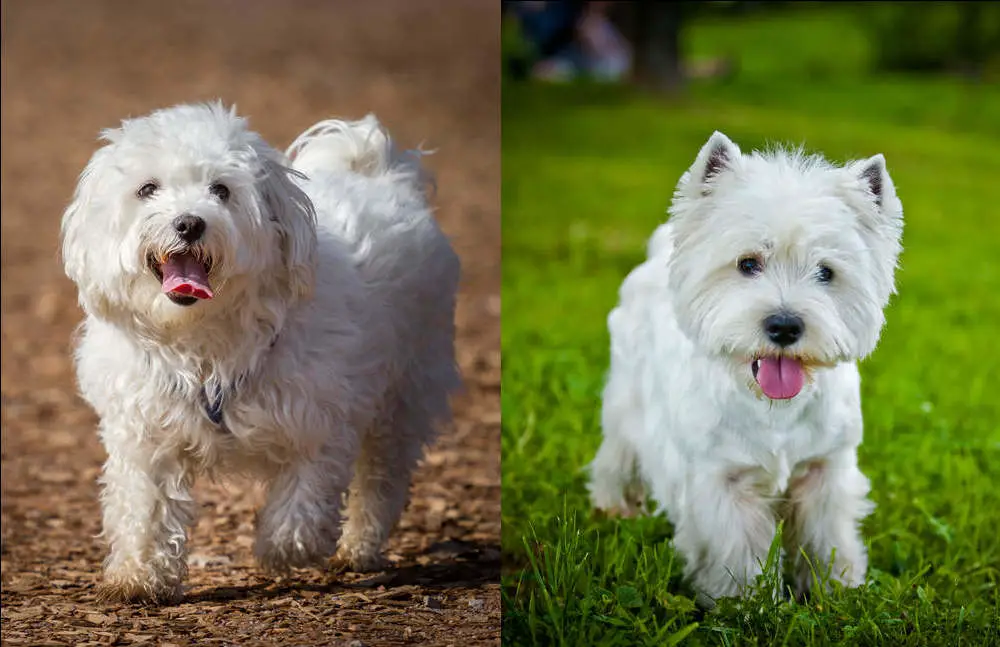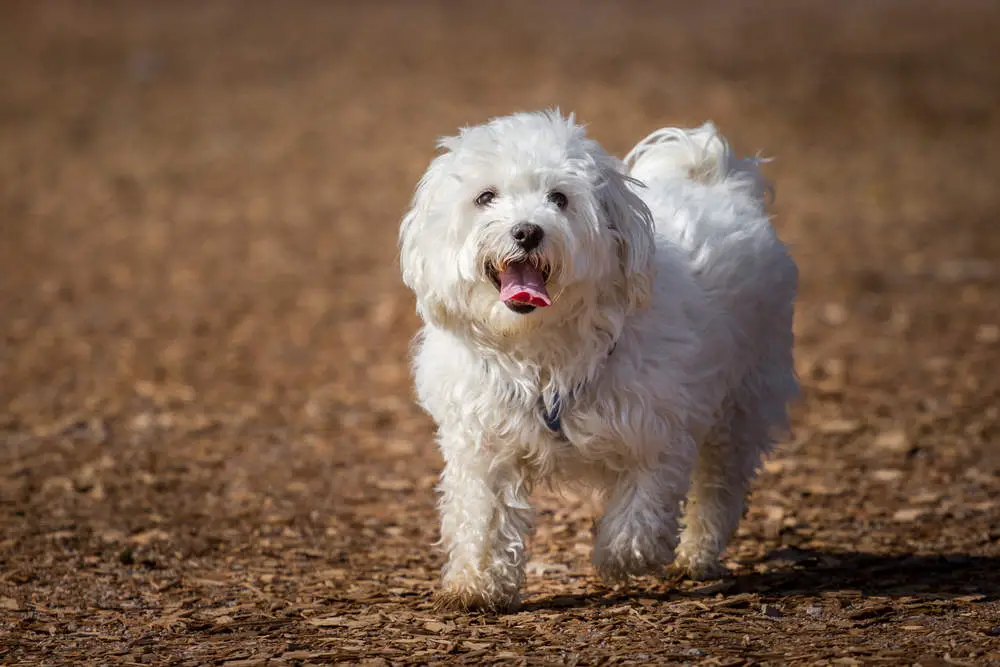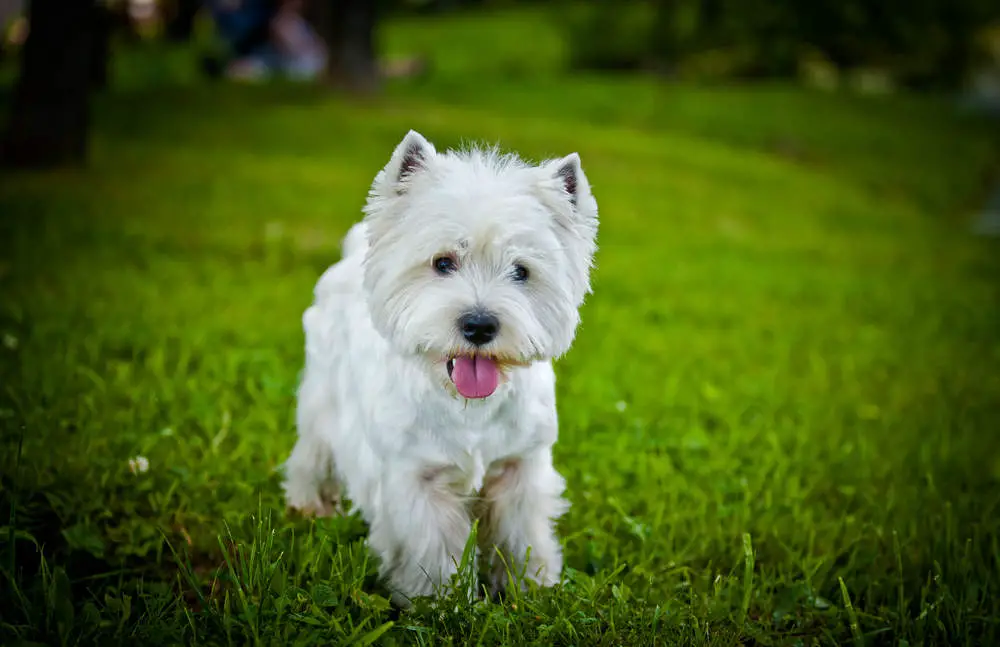
Maltese and Westie are two dog breeds that are often used interchangeably by people. Most people tend to get confused between the two, thinking that they are the same. Though there are similarities between the two, these are two different dog breeds.
Maltese vs Westie: History and Origin
To understand the differences between these two types of dogs, one needs to delve a little into their history and origin. Let us find out what these differences are!
Maltese: A Short History
The Maltese trace their history and origin to Italy. They are quite an old breed that continues to be popular today in various parts of the world. They are also called Melita or Maltese Lion Dog in some parts.
Though it is believed to have originated in Italy, the actual origin has been a matter of debate for a really long time. What is certain is that this dog has been around for several centuries and continues to remain popular due to its small size and cute demeanor.
Westie: A Short History
Westie or the West Highland White Terrier trace their origin back to Scotland in Europe. These dogs were used earlier for hunting otters and killing rats and vermins. This breed became particularly popular during the 20th century when people started spending big money to get them home.
Such is its popularity that the breed remains to be the third most popular dog breed in the UK, though there has been a decline in the numbers since 2001. In the United States, it remains firmly popular with a steady population.
Maltese vs Westie: Appearance
To an untrained eye, the two dogs may seem similar because of their small size, but that is far from the truth. There are remarkable differences between the two breeds. Let us take you through what these are.
Maltese: What Do They Look Like?

Maltese is one of the most popular toy dog breeds out there. They are distinguished by their silky, pure white coat, ears that hang around their face cutely and a tail that curves over their back. They are light in weight and do not grow to over 8 pounds in most cases.
They have deep brown eyes and a black button nose that make them look really cute. Other physical characteristics include a finger-wide dome, rounded skull, compact body and a tail that is curled to the height of its body.
They are hypoallergenic and are known to don an expressive look thanks to their long hair, drop ears and deep, dark eyes. They have sensitive paws and you will also see changes in their appearance, especially their nose, depending on their exposure to sunlight.
When they aren’t exposed to enough sunlight, their nose can turn pink. The nose will automatically darken once they get enough sun exposure.
They are mostly pure white in color, though sometimes you may find some dogs that ate ivory though it is rare.
Westie: What Do They Look Like?

Westies are small dogs that weigh between 15 and 20 pounds and are 10-11 inches in height. Westies are distinguished by their beautiful, deep and dark almond-shaped eyes that can instantly make you fall in love with them. They have pointed and erect ears that give them a cute look.
They have a furry face and they don a thick undercoat and a rough outer coat. Most Westies are pure white as that is something that their breeders are particular about. Although you can sometimes find a few that are light wheatish in color.
Their other physical features include a black nose, small fitted jaws and a deep chest. They have paws that are slightly turned out. This ensures that they are able to navigate rocky terrains without any difficulties. If you bring a very small puppy home, you are bound to find some pink marks on its nose that will turn black as it grows older.
They have a short, cute and slightly thick tail and together the physical features make it look like a toy dog that you can’t resist getting home.
Maltese vs Westie: Temperament
A dog is not just known by how s/he looks but also by its temperament. Even if you like a particular breed a lot, generally you would try and find out about its temperament and check if it suits your lifestyle. Only after checking the compatibility, do people go ahead.
What are Maltese and Westies like? Are there significant differences in their temperament? Let us find out!
Maltese: What You Need to Know about Their Temperament
Maltese makes a great family dog because it is affectionate and has a loving and caring nature. It is a social dog that is fun to be around. In its company, you are always going to feel loved and special.
Maltese loves attention. If you lead a very busy life, these may not be the best dog for your home. Maltese would feel ignored if you don’t acknowledge their presence or don’t shower them with attention. They need constant validation.
Maltese are very social and usually take very well to strangers and other pets. This sometimes poses a problem and, therefore, you will have to train your dog properly to avoid any accident that may be a result of avoidable interaction.
These are gentle dogs that won’t need a lot of exercise like some of the big guys out there but they would certainly enjoy walking around the yard with you and accompany you for walks. They just love to stick around you.
Another thing that you need to be careful about with Maltese is that they are prone to coughing. Maltese are small dogs that get excited frequently. They may start coughing after seeing you after a long time, or at times of play and activity, they inhale air rapidly leading to stress on the trachea and subsequently collapse.
You will have to be vigilant about this and sometimes, this may also need medical attention. So, our recommendation will be to tread carefully.
Maltese: The Good
- They’re easy to carry around because of their weight and friendly disposition.
- They are playful and affectionate.
- Maltese are peaceful and non-confrontational with strangers.
- They don’t shed heavily that makes picking after them easy.
- Maltese have a long life and will be around for a long time to keep you company.
Maltese: The Bad
- They are a fragile dog breed and would need monitoring and lots of attention.
- Maltese are prone to coughing and sometimes that can become serious.
- They exhibit separation anxiety.
Westie: What You Need to Know about Their Temperament
The Westie has a temperament that supersedes its small size. It is mature and would not give you trouble or throw tantrums. It does not have any regal air around it. They are alert, lively and always up for a good chase and this makes being around them fun and lively.
It is also a friendly dog and will get along with other pets and children (with some training). It craves companionship and would jump forward at the sight of people to make friends.
One of its best personality traits is that it is a loyal and fiercely protective dog and will ensure no harm comes to you in its presence. Don’t get fooled by its size, it is hardy and will do anything to make you happy and keep you safe.
Above all, it is a robust dog that enjoys being taken around. It enjoys an active lifestyle and can also be happy living independently. What this means is that it won’t become clingy or exhibit separation anxiety if you can’t give it time due to any reason.
Westie: The Good
- It is small yet strong so you won’t have to worry about them being frail.
- It does not have severe exercise needs so you won’t have to plan a lot around them.
- They make a wonderful watchdog owing to their curiosity.
- Maltese don’t shed too much hair that makes keeping them home easy.
- They’re receptive to training and do not pose problems with strangers.
- They get along with other pets with some training.
Westie: The Bad
- They can be stubborn at times.
- Maltese are prone to a lot of health issues.
- They have a tendency to dig holes.
Maltese vs Westie: Health Concerns
While choosing a dog for your home, it is important that you take into consideration a number of factors. It is not only enough to take fancy to a breed unless you are aware of what you are signing up for.
The same applies to the health concerns of any dog that you may be considering adopting. Here is what you need to know about the health concerns of the Maltese and Westie.
Maltese Health Concerns
Maltese are susceptible to viral and bacterial infections much like any other dog so you would have to get it vaccinated. Additionally, it is prone to reverse sneezing and a collapsed trachea that may become a big issue if ignored. If you notice your Maltese coughing incessantly, you may have to consult a doc.
Sometimes, they can also complain of a condition called luxating patella and progressive retinal atrophy. These are rare but if you notice anything amiss, consult a vet.
Westie Health Concerns
Westies are susceptible to skin allergies that you will have to be vigilant about. Sometimes, though rare, they may suffer from a condition called epidermal dysplasia that causes inflammation in the body accompanied by severe itching. Westies may also face some joint problems.
Additionally, pancreatitis and colitis are common in Westies. If you notice any changes in your dog or notice signs of visible discomfort, do not self-diagnose and instead take your Westie to a vet immediately.
Maltese vs Westie: Care and Grooming Needs
The care and grooming needs of a dog play a key role in helping you choose the right breed for your home. If you are confused between Maltese and Westie, read on to know how much care each of them needs.
Maltese Care and Grooming Needs
Maltese needs healthy food and plenty of exercise. You will have to be cautious when picking food as they can’t eat anything and everything and the packaged food you give them has to be suitable to the Maltese particularly.
They also have dental care needs that you would have to cater to. This includes brushing their teeth twice every week and clipping their nails periodically. You will also have to tend to their hair with regular brushing and haircuts.
Westie Care and Grooming Needs
Westies are good with home-cooked food but you will have to feed them four times a day at least to keep them happy. Too much chicken and beef may induce allergies so consulting a doctor about optimum quantities and types of food will be ideal.
You can also go with packaged food for the dog but they would thrive on home-cooked food and veggies.
They have frequent bathroom needs and you will have to take them on frequent walks. They love to be fit and this helps to keep the weight away. As they grow old, you will see them gaining weight.
You will also have to tend to their mane with regular brushing and make sure you keep their dental hygiene on point.
Both the dogs have similar training needs and you would need to train them for socializing and behaving well with children and other pets if any. Though they are both not naturally aggressive, a little training would be very useful.
Pro Tip: Though the grooming needs seem similar for Maltese and Westie, Westies are much easier to train.
The Final Word
We have tried to give you an extensive lowdown on both Maltese and Westie to help you arrive at a decision. Though both are adorable breeds, you must weigh their traits and characteristics and see which one best suits your lifestyle and preferences! A carefully taken decision will serve you well in the long run.
